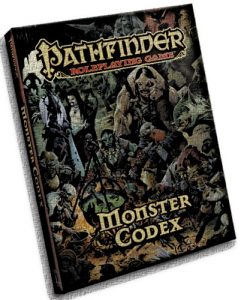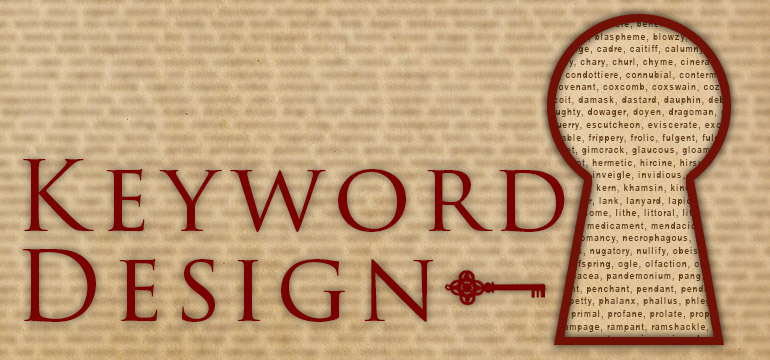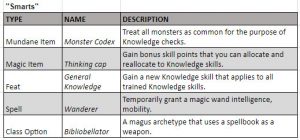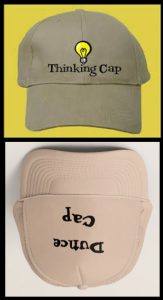In Keyword Design, I use a single word as inspiration for a mundane item, a magic item, a feat, a spell, and a class option. Today’s word is “Intelligence” as suggested by… well, no one.
In the last Keyword Design (cunning), I confessed that I misunderstood the subtleties of the word’s meaning and had started writing straight intelligence-based options. I had my notes for the options I’d already designed and figured if I ever release a Keyword Design Compilation, the lost Intelligence options would be bonus content.
Then I sat down to write the next keyword and all I could think about were these pushed-aside Intelligence options. So I’m throwing format and convention out the window! Until next blog! Today is all about Intelligence options!
New Mundane Items
MONSTER CODEX
Cost: 450 gp Weight: 3 lbs
The pages of this glossy tomb are liberally filled with notes and shorthand describing the capabilities of the monstrous creatures of the world and the planes beyond. Meticulously cataloged for ease of reference should the owner of the codex need an answer to a question in a hurry.
The wielder of a Monster Codex can make a trained Knowledge check as a standard action or an untrained Knowledge check as a full round action, ignoring the restriction on checks above DC 10. The subject of this check is considered common for the purpose of determining the DC.
I often wonder what should be common sense to a Pathfinder character. Like, they’re adventurers, they should know as much about what they’re likely to encounter as a mechanic knows about different cars or a principal knows the kids at their school, right? Is knowing that a troll is vulnerable to fire like knowing that one kid in 3rd grade is a pyromaniac, ie something everyone knows because it’s important to know?
I usually sum up that question with “It’s not like PCs have access to the Bestiary,” but honestly, wouldn’t they? Wouldn’t there be a reference book in Golarion compiling all of the important information adventurers have learned that other adventurers should know? The Pathfinder Chronicles are described more as history books, I’m looking for an Encyclopaedia Monstrum. Hm, that’s actually a good name for it. Oh well, an also good alternative name that’s more fun for a blog is taking the IRL title for a similar book, the Monster Codex. Actually, the book described is closer to a Bestiary, but functionally what I designed sounds more like a Monster Codex.
New Magic Item
THINKING CAP
Aura faint transmutation; CL 4th
Slot head; Price 2750 gp; Weight –
DESCRIPTION
This smooth and nappy black hat, ornamented only with five yellow citrines fits snugly, applying pressure just shy of uncomfortable. Five times per day, the wearer may attempt another Knowledge skill to answer a question they previously tried to answer. They can use this ability even if the first check was successful to attempt to gain further information on the subject.
After being worn for 24 hours, the wearer additionally gains 5 bonus skill points they must spend in Knowledge skills. These bonus skill points follow the same rules as normal skill points. The wearer can not have more ranks in a skill than their HD, and a skill with a rank in it from a bonus skill point is considered a trained skill.
Once per day as a full round action that provokes attacks of opportunities, the wearer may reallocate these bonus skill points. They remain with the skills on which they were spent until the next time they are reallocated by the wearer. If the last skill rank in a skill is reallocated, it is no longer considered a trained skill of the wearer’s.
CONSTRUCTION
Requirements Craft Wondrous Item, fox’s cunning; Cost 1375 gp
BONUS! New Cursed Item
DUNCE CAP
Aura moderate illusion; CL 10th
Slot head; Price 5500 gp; Weight –
DESCRIPTION
This hat appears smooth and nappy to the wearer but is clearly a tall white cone to observers.
Whenever the wearer makes a Knowledge check, there is a 50% chance that any information is completely incorrect.
Intended Magic Item: Thinking Cap
Enjoy your bonus, perfectly normal magic item. Try it on, it’s great!
Pathfinder needs more successful Knowledge checks! You might think “Oh no, if players identify a monster’s abilities, they’ll take away what makes that monster unique,” but I disagree. There is a vetting out period in the first round or two of a combat with an exotic monster. Players first try to figure out what its most likely abilities and defenses are -is it made of an element, does it look strong/solid/magical/hungry, how does it move- using the same process: dedication, a knowledge check, followed by trial and error. The better they pass that knowledge check, the less trial and error they need and the faster they can get to the tactical combat. Trial and error will be similar every time but the tactics will change based on the monster. Passing a knowledge skill cuts to the interesting part of combat.
Furthermore, GMing an encounter when the party knows what it’s up against is both easier and more engaging. Instead of calling it the thing, you can use the evocative name that someone was paid to come up with. Instead of finding generic terms for its abilities while also trying not to accidentally use the names of other abilities in the game, you can call out its powers by name like a Pokémon trainer.
ALSO! There are a lot of cool options in the game that get dismissed as situational. As a player it’s hard to choose a cool ability that’s barely available over a generic ability that’s always available. But since the Advanced Class Guide, Pathfinder has introduced more flexibility on the fly options, meaning these situational abilities get a second chance to shine as long as players are aware that their characters are in that ability’s situation.
New Feat
GENERAL KNOWLEDGE
Your broad study applies universally.
Benefit: You gain a new Knowledge skill called Knowledge (general). Add your ranks in Knowledge (general) to any trained Knowledge skill you roll. When making an untrained Knowledge skill check, you can use your Knowledge (general) bonus instead of your bonus in the appropriate Knowledge skill. This is still considered an untrained Knowledge skill check.
Knowledge skills are both extremely useful and also balanced. This feat basically lets you add two ranks per level to all of your Knowledge skills at the cost of only 1 rank, which for most other skills would be game breaking. For Knowledge skills, it just means the party gets more information, which is usually a GM’s dream. This isn’t like a high Perception or Sense Motive ruining an NPC’s plot because Knowledge is static. And as I said earlier, knowing more about a monster’s abilities improves encounters because the party deploys new tactics. The potential of a monster’s abilities can affect the encounter as much as the abilities themselves.
New Spell
WANDERER
School transmutation; Level bard 4, occultists 4, sorcerer/wizard 4, witch 4;
CASTING
Components V, S, M (a handful of sticks, at least four)
EFFECT
Range touch
Target wand touched
Duration 1 min./level (D)
Saving Throw none; Spell Resistance no
DESCRIPTION
The handful of sticks take the shape of legs and attach to the wand like a Tiny quadropedic animal. It becomes an animated object called a wanderer and uses the statistics of a rat but with the Construct type and the Intelligence of a wizard’s familiar, using your caster level as your effective wizard level to determine the Intelligence of the wanderer. If you are able to cast the spell on the wand, the wanderer can cast the spell as a standard action, using charges as normal.
If you have a familiar, the wanderer can instead use the statistics of the same animal as your familiar, but with the Construct type.
This might be the greatest option I have ever named. The need I wanted to fulfill was another option to get a fallen comrade a bit of healing. I had visions of a wand of cure light wounds wandering over to the downed hero. And then I was all “Oh my goodness! Wander!” And I’ve felt pretty good about myself ever since.
New Class Option
BIBLIOBELLATOR (magus archetype)
Most casters who use spellbooks revere their magic tome, guarding it with their life. Bibliobellator are magi that see their spellbook as their greatest weapon in more ways than one, swinging its enchanting pages like a loaded fist.
Weapon and Armor Proficiency: A bibliobellator is proficient in simple weapons and books as improvised weapons.
This alters the magus proficiencies.
Scholastic: A bibliobellator gain 2 additional skill ranks each level. These ranks must be spent on Intelligence-based skills. All Craft and Knowledge skills are class skills for bibliobellator, as are Linguistics and Spellcraft.
Bibliophile: A bibliobellator cares for his spellbook as a wizard cares for his combined with how a fighter cares for his favourite weapon. When bibliobellator wields his spellbook as a weapon, it gains Hardness equal to the bibliobellator’s magus level and hp/inch equal to twice the bibliobellator’s magus level. Additionally, the hand in which the bibliobellator wields the spellbook is considered free for the purpose of casting spells with somatic components.
A bibliobellator can only use his arcane pool to enhance books he wields, no other weapons. In addition to the standard uses of arcane pool, the bibliobellator can expend 1 point from his arcane pool as a swift action to improve his spellbook as a weapon or as a shield. As an improved weapon, the spellbook deals damage as the unarmed strike of an unchained monk of his magus level for 1 minute. As an improved shield, he gains a shield bonus equal to his Intelligence modifier for 1 minute. These improvements do not count against the enhancement bonus he can apply to his weapons. Additionally, as an improved weapon, the spellbook is now considered both a bludgeoning weapon and a slashing weapon.
At 7th level, a bibliobellator can improve his spellbook as both a weapon and a shield by expending 2 points from his arcane pool as a swift action.
This ability alters arcane pool and replaces Medium Armour.
Like last week, this was almost the bookrager (or page rager), the wizard answer to the sorcerer/barbarian hybrid bloodrager. The more I developed the idea of a caster/warrior hybrid that uses a spellbook as a weapon, the less the rage component made sense. The magus was a much better fit. I love the fisual of a sagely warrior hitting a monster with an ancient spellbook, electricity bursting from its pages, or swinging a flaming tome.
Thanks again to ignorance for the keyword suggestion. If you have thoughts on the balance and use of these abilities, or you would like to offer a single word that you think can inspire a mundane item, a magic item, a feat, a spell, and a class option, let me know in the comments below.









Imagine a Encyclopaedia Monstrum picked up by some low-level PCs and it have all sorts of bad information in it! A plethora of bad ‘monster knowledge’ books that have different degrees of accuracy.
Wanderer is Awesome!!!